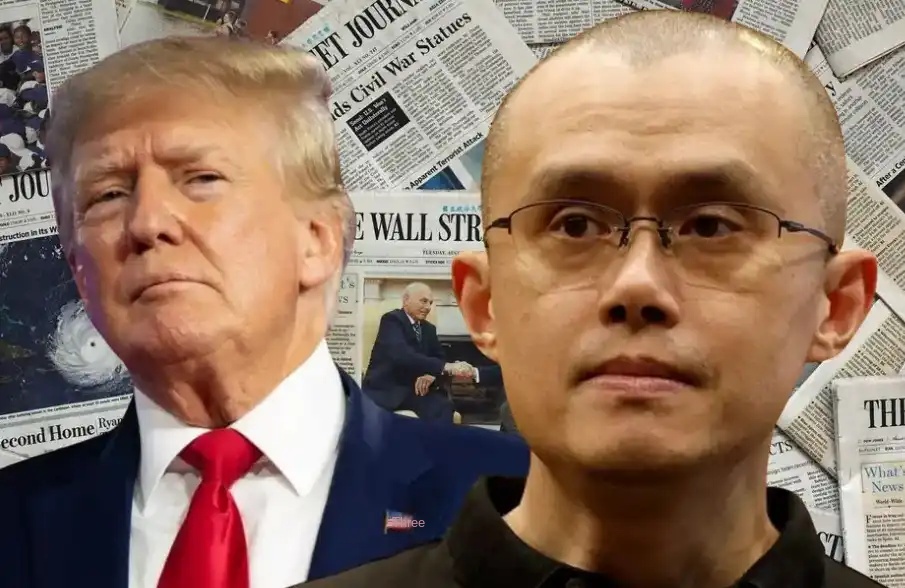How credible is Trump’s Bitcoin conference promise?
Original source: Vernacular Blockchain & Odaily Planet Daily
Recently, Trump attended the 2024 Bitcoin Conference as a top guest, and under the spotlight, he made a series of "sweet" promises in the eyes of crypto enthusiasts, expressing his "love" for Bitcoin almost without reservation. Trump said that the market value of Bitcoin will exceed that of gold, and after being elected, he will make the SEC chairman who is not crypto-friendly step down, and will also retain the Bitcoin pledged by the government as a strategic reserve, etc., and he just said "Let the United States ALL in Bitcoin", and the audience responded with warm applause. Due to the attendance of Trump and others, this conference has also become the highest-level Bitcoin summit in history.
"ETF, SEC, interest rate hikes, elections...", when we find that these focuses that have had a huge impact on the crypto market are all concentrated in the United States, the United States has become the dominant force in the crypto market, and has almost mastered the "pricing power" of crypto assets such as Bitcoin. The upcoming US election will have a far-reaching impact on the crypto market, so the crypto community has been paying close attention to the US election recently.
Trump's frequent overtures to crypto assets are considered good news by many people, while others believe that this is just a "play" to win votes. After becoming president, he will "pull up his pants and leave" or even "burn the bridge after crossing the river".So how credible are Trump's sweet words? Who is right and who is wrong? Everything has to start with the propositions and values of the two major camps of the Republican Party and the Democratic Party in the United States...
01 Why is Bitcoin favored by Trump and the Republican Party?
Many people believe that in the context of the confrontation between the Republican Party and the Democratic Party in the election year: Bitcoin crypto users and voters are suppressed by the Democratic Party-dominated authorities,Trump's overtures are conducive to winning more votes and generous donations, paving the way for the next election. This logic makes perfect sense, but it is not certain that the Republican Party and Trump will "abandon" after winning the election. There are many similar examples in history.
In fact, there is no need to worry about this. Many people only know one side of the story, and there is another very important background, which is the propositions and values of the Republican Party to which Trump belongs.
To put it simply, the values of the Republican Party, including Trump, determine the route and main direction of their future policy making. In fact, the Republican Party and Trump's propositions include: Support for free markets, personal freedom of economic policies and conservative social concepts, a certain degree of right-leaning conservatism, and Trump proposed policies to support technological innovation, advocate personal privacy and security, and oppose overly concentrated monetary control and financial supervision. In general, people on the right may be more inclined to support and participate in technological innovation and market freedom.
It is not difficult to see that Bitcoin's core concept of returning financial power to individuals is completely in line with the values of personal freedom and market freedom of the Republican Party and Trump. At the same time, Bitcoin is also a new technology and investment opportunity that they support, and is more favored and supported.
This can also be seen from Musk, who also supports the value concept of Bitcoin. Musk said in a recent interview that he is an admirer of American values. He has supported the Democratic Party in history and now supports the Republican Party. He is just looking for which party is more in line with the American values in his mind. Currently, the Republican Party is more in line with his advocated maintenance of talent and application, not abusing DEI (i.e., Diversity, Equity, and Inclusion, which is a typical left-wing value), and advocating basic American principles such as personal freedom, so he now supports the Republican Party.
Of course, Trump's speech at the Bitcoin Conference was still a bit "cheesy", and his promises are expected to be discounted. After all, the purpose now is more to win votes, and when he really holds a high position, he needs to weigh the pros and cons. The implementation of new policies is expected to inevitably lead to controversy.
Finally, the Bitcoin market's reaction to Trump's speech was flat. Everyone knows that we can't listen to what he says, but we have to see what he will really do at that time.
02 Why don't the Democrats like Bitcoin so much?
As the leader of the current US government, what the Democratic Party has done in recent years has actually been seen by all of us. Although the attitude has eased as the election approaches, in fact, including Biden, SEC Chairman, and the current presidential candidate Harris, almost all Democratic leaders seem to dislike Bitcoin.
It is still a question of values. As Musk mentioned above, the Democrats clearly have a left-leaning stance and policy propositions, and some have even criticized them as "extreme left". The Democratic Party's propositions include environmental impact and sustainability, financial inequality and social justice, and stronger supervision, which reflect its values of weakening individual freedom and power and emphasizing public and collective interests.
Obviously, under the left-leaning values, the core concept of Bitcoin is not so harmonious, so the left-wing Democrats, including Biden and Harris, don't actually like Bitcoin that much.
03 No matter who is elected, they can't change the wheel of history
1) There are also many supporters within the Democratic Party
Although the Democratic Party leans to the left, not all of them are "extreme left". Most people are still rational and stick to the facts. The Democratic Party has previously made it clear that they will move closer to the centrists and away from the extreme left on market and financial regulation issues.
Previously, in the vote on the bill SAB 121 to ban crypto-unfriendly cryptocurrency accounting policies, the Republican-led House of Representatives passed it by 228-182, and the Democratic-led Senate passed the resolution by 60 votes to 38. Although it was ultimately vetoed by Biden, it shows that a considerable number of Democrats also support Bitcoin. I believe that with the internationalization and mainstreaming of crypto assets, more progress will be made in the future.
2) American Core Values
For so many years, people have always thought that Bitcoin is one of the main challengers to the hegemony of the US dollar and should have been blocked long ago. Even if the United States cannot completely block it, it has the ability to marginalize it. But in fact, it has not, not only because of Bitcoin's own anti-fragility, but also because one of the reasons behind it is that it is difficult for Americans to violate the core values of the United States.
Individuals were once prohibited from holding gold in the United States. However, some people believe that this ban violates the principle of personal freedom and is regarded as an infringement of personal freedom and property rights. The abolition of the ban in 1974 is seen as a restoration of economic freedom and personal rights. Although the ban played a role in responding to the Great Depression, in the long run, it is regarded by most people as a failed policy because it restricts personal freedom and fails to fundamentally solve economic problems.
Now Americans know that it is difficult to ban private ownership of Bitcoin like they did with gold. First, there are lessons learned from previous failures. Second, Bitcoin is just a string of characters compared to physical gold. It is impossible to enforce it by spying on the personal privacy of every American.

If we start with Bitcoin, whose core concept is freedom and personal power, and Americans do not even have the power to hold a string of characters in their hands, then we have to overthrow the Statue of Liberty first. In fact, no matter how much the Democrats and Republicans disagree, it is impossible for anyone to stand up and overthrow the Statue of Liberty, which symbolizes freedom, democracy, and the American dream. These core values can be said to be the foundation of the United States.
04 Summary
In the debate, crypto assets such as Bitcoin also gained soil for growth and spiraled upward. No matter who is elected in the end, it cannot change the wheel of history rolling forward. If you don’t believe it, you can see that Bitcoin is only a thin layer of window paper left to become a reserve asset...
Odaily Planet Daily previously summarized the fulfillment rate of Trump’s promises made when he ran for president in 2016. Here we also reprint it as follows for the convenience of readers.
From the point of view of July 2024, all parties generally predict that it is only a matter of time before Trump wins this year’s US election. From the perspective of the crypto world, Trump is undoubtedly a more pro-crypto image than the current US President Biden; not only does he chat and laugh with various crypto bosses, but he also chooses a pro-crypto vice presidential candidate and makes many pro-crypto promises.
But there are also dissenters: On July 11, Arthur Hayes called Trump’s “sudden interest in crypto” insincere.
Hayes said,
“Courting the young, politically active and upstart crypto community may help Trump win the election. Therefore, Trump is boosting his image among crypto supporters by saying all the “right things.” Unfortunately, this new political attention has caught the attention of many in our industry. The political Hot Chicks are trying to bring us home, not the other way around. These feelings are wrong. The playboys of crypto are not movie stars, but fools standing on the edge of the party. I am frustrated that many crypto experts who should know better are now blindly hosting gimmicky fundraisers for the Trump campaign. They mistakenly believe that Trump is sincere and that if they donate enough money, the “kill crypto operation” will go away. This is pure nonsense. Trump is a shrewd politician. He will say anything to anyone who wants to be re-elected. Once in office, anything to do with cryptocurrency will become a distant memory. "
So, let Odaily Planet Daily take you through history: Trump has run for president of the United States several times. What are his political promises? How many have been fulfilled? Especially in the fields of economy and new technology, the proportion of successful realization of this part will in a sense become a reference for Trump's attitude towards the crypto field.
How many of Trump's campaign promises have been fulfilled?
Trump actually made many promises during his previous campaigns. In general, statistics will select the promises that are more serious, made in public, and mentioned several times. According to statistics from the neutral website PolitiFact, during his last presidency, Trump successfully kept about 23% of his promises, gave in and partially fulfilled 22% of his promises, but broke about 53% of his promises. In other words, in terms of keeping campaign promises, the data seems to support Arthur Hayes's point of view.

The proportion of Trump's promises he kept. Source: PolitiFact
In the economic field, Trump’s promises in the last term that he successfully kept include:
· Did not cut Social Security payments (he did try to cut and break his own promise, but was blocked by Congress)
· Raised tariffs
· Renegotiated the North American Trade Agreement
· Reduced some taxes
· Withdrew from the TPP
The promises that he did not successfully keep include:
· Invest in US infrastructure and set up a US infrastructure fund
· Grow the economy at 4% a year
· Return industry to the United States
· Cut federal spending
· Reduce federal debt and reduce the deficit
· Reduce the number of tax brackets from seven to three
· Get China out of the WTO
· Build a wall across the US-Mexico border, and let Mexico pay for it
Although we make valid predictions about the future based on this part of the data, we can see thatIf it is something that the Trump administration has full power to achieve, some of it has indeed been resolved; but if it involves more underlying economic development issues (such as US government debt), it is highly likely that it cannot be resolved.
What crypto promises has Trump made so far?
Currently, Trump's promises in the crypto field are summarized as follows: (Data sources come from CNBC and Bloomberg, etc.)
1. Trump invited holders of his NFT series to his home in Florida and promised to end regulatory hostility to the industry if he is re-elected;
2. At the Libertarian Party National Convention, he promised to release Ross Ulbricht, who was convicted of creating the dark web market "Silk Road";
3. At the same conference, he vowed to keep Senator Elizabeth Warren (who proposed a strong regulation bill for the crypto industry) and "her goons" away from Bitcoin holders.
4. In June, after meeting with executives of several Bitcoin mining companies, Trump announced that if he returns to the White House, all future Bitcoins will be minted in the United States. (This should not be considered a hard promise)
From these points, "ending regulatory hostility" in some way, such as replacing Gary Gensler, and releasing Ross Ulbricht's rights that do belong to the White House, then based on previous data, it may indeed be a goal that Trump can achieve after taking office.
It is worth mentioning that this is almost the opposite of Trump's attitude five years ago. In 2019, Trump himself tweeted, "I'm not a fan of Bitcoin. Its value is highly volatile, like it's based on air."

Trump tweeted in 2019. Source: Bloomberg
Original link:
"How credible is Trump's Bitcoin conference promise? "
"Guess how many of Trump's campaign promises have been fulfilled? "
Welcome to join the official BlockBeats community:
Telegram Subscription Group: https://t.me/theblockbeats
Telegram Discussion Group: https://t.me/BlockBeats_App
Official Twitter Account: https://twitter.com/BlockBeatsAsia


 Forum
Forum Finance
Finance
 Specials
Specials
 On-chain Eco
On-chain Eco
 Entry
Entry
 Podcasts
Podcasts
 Activities
Activities
 OPRR
OPRR








